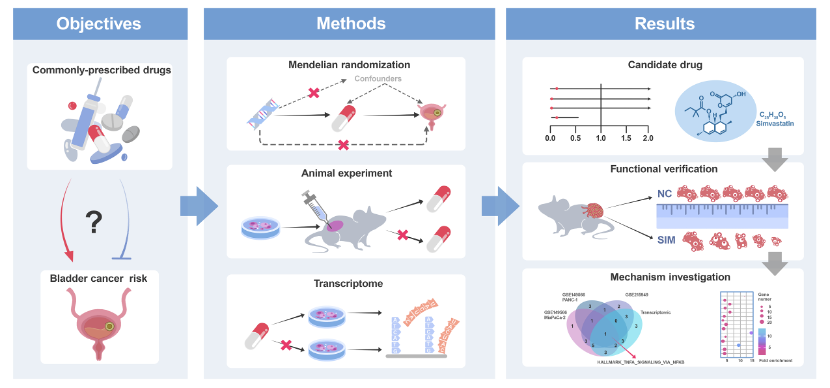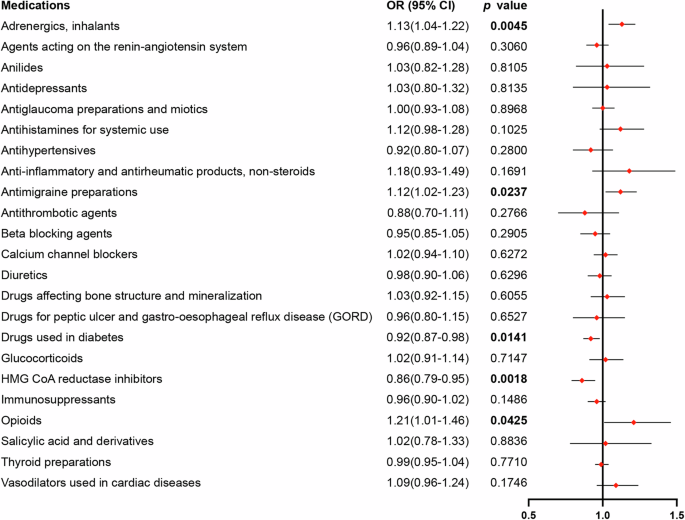Unveiling the association between HMG-CoA reductase inhibitors and bladder cancer: A comprehensive analysis using Mendelian randomization, animal models, and transcriptomics
Published in Cancer
In recent years, the association between commonly prescribed drugs and cancer risk has attracted much attention. However, because of the complexity and diversity of the prescribed drugs, current evidence is still limited about whether and how these drugs affect bladder cancer (BLCA) risk. Owing to reverse causation, sample size and selection bias, traditional observational studies could yield biased and controversial conclusions. Mendelian randomization (MR) mimics the method of randomized controlled trials (RCTs) by using single nucleotide polymorphisms (SNPs), which are randomly allocated during meiosis, as instrumental variables (IVs) to proxy the exposures of interest [1, 2]. In this study, we performed MR analysis to investigate the associations between 23 types of prescribed drugs and BLCA risk, then we validated the significant findings by animal experiments and transcriptomic analysis.
Among the 23 prescribed drugs, HMG-CoA reductase (HMGCR) inhibitors had the most significant effect on BLCA risk. Due to the variety of HMGCR inhibitors, four statins, including two lipophilic statins (atorvastatin and simvastatin) and two hydrophilic statins (pravastatin and rosuvastatin), were further analyzed. Although all of them seemed to exhibit anticancer effects, only simvastatin was significantly associated with reduced BLCA risk. In vivoexperiments also confirmed that simvastatin could reduce the proliferation of BLCA cells, and transcriptomics analysis revealed that simvastatin was associated with DNA replication, cell cycle regulation, and the TNF-α/NF-κB pathway, which could regulate the BLCA cell proliferation.
Furthermore, we analyzed the correlation between HMGCR mRNA expression and BLCA via TCGA and GEO datasets, as well as BLCA tissue samples. We found that the mRNA expression level of HMGCR was higher in BLCA tissues than in normal or paracancerous tissues, and that higher HMGCR expression was associated with shorter overall survival in patients with BLCA. HMGCR plays an important role in regulation of lipid metabolism. Therefore, we further analyzed the association between blood lipids and BLCA risk via MR analysis, and found that the total concentration of lipoprotein particles and VLDL cholesterol might affect BLCA risk.
In summary, this study provided a comprehensive analysis indicating that HMGCR inhibitors, particularly simvastatin, could be potential therapeutic options or adjunctive therapies for bladder cancer.

Schematic illustration of this study. We performed combined Mendelian randomization, animal experiments and transcriptomic analysis to provide new evidence for clinical practice related to bladder cancer treatment.
Dr. Yu Xiao, Dr. Gang Wang, and Dr. Xinghuan Wang are the corresponding authors of this paper, with doctoral candidates Houyi Wei and Zhilong Li serving as co-first authors.
References:
1. Burgess S, Butterworth A, Thompson SG. Mendelian randomization analysis with multiple genetic variants using summarized data. Genet Epidemiol. 2013; 37: 658-665.
2. Zheng J, Baird D, Borges MC, et al. Recent Developments in Mendelian Randomization Studies. Curr Epidemiol Rep. 2017; 4: 330-345.


Please sign in or register for FREE
If you are a registered user on Research Communities by Springer Nature, please sign in